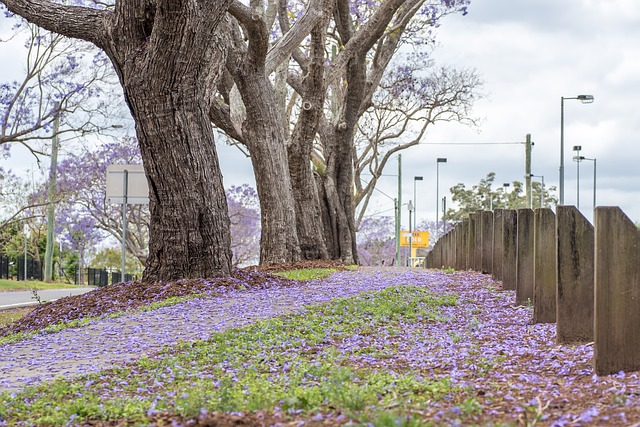For a long time now, I have viewed trees as a source of meditation and of poetry. The title of this post is really a metaphor for appreciating our own life and the uniqueness of others. Jacarandas in Brisbane flower during October/November which is around exam time and their stunning display of purple flowers serves as a reminder of all we have accomplished in formal learning and all the people who have helped us in these achievements. So, Jacarandas help us to appreciate our life and what we have achieved. At the same time, they remind us that outward success is ephemeral – impermanent and quickly fading, which is a characteristic of the Jacaranda flowers.
Savouring your achievements
In a previous post I discussed in detail how savouring your achievements can be a mindful exercise in appreciating your opportunities in life and valuing what you have been able to achieve through the assistance of others. Reflection on your study achievements can build confidence and a sense of self-efficacy – your belief in being able to achieve a particular outcome through focus and effort. You can reflect on what it took personally to graduate at school, university and/or a TAFE College
You can be grateful that you have acquired the knowledge and skills that come with your study achievements and that have opened the way for many other opportunities in life, e.g. the nature of the work that you do, the opportunity to travel or the ability to build relationships and interact effectively with others.
Acknowledging the contribution of others
Recognising that your achievements were accomplished through the support of others is a great leveler and a source of appreciation and gratitude. Those who have contributed to your achievements could include your parents, schoolteachers, educators, lecturers, trade trainers, or professors. Some had a role to play in your formative years, others in your adulthood as you made your way in the world. You can value their contributions to your personal growth in knowledge and skill.
Of particular importance, is focusing on the people who played a significant role at different turning points in your life. They could be mentors, coaches, friends, bosses, or relatives. It pays to spend time to focus on a particular individual who has influenced the way you think, how you go about your work, how you relate to others and/or what you consider important. It may be someone who encouraged you and supported you to believe in yourself and what you are capable of. This type of reflection reinforces our connectedness and interdependence and can deepen our humility and gratitude.
Radiant beauty, quickly shed
A key source of insight when observing or reflecting on Jacarandas is the ephemeral nature of their beauty. I once captured this thought in a poem about Jacarandas when I wrote, “radiant beauty, quickly shed”. This is a reminder that external signs of success can quickly fade or disappear – as many people have found during the onset of the global pandemic. Thomas Merton reminded us that what is important is the “inner landscape”, not externalities, when he wrote:
If you want to identify me, ask me not where I live, or what I like to eat, or how I comb my hair, but ask me what I am living for…
Savouring our achievements is not designed to be an exercise in considering ourselves to be “better than” others; it is designed to help us to realise the gifts, talents, knowledge, skills and supports that we have to enable us to make a contribution to the welfare of others. It is one way to help us overcome the barriers to achieving our unique contribution and life purpose. We can be prompted to ask ourselves, “What am I doing with my life and all that I have been given in terms of opportunities, knowledge, skills and insights?”
Frank Ostaseski reminds us that one of the lessons from death and dying is the need to cultivate a “don’t know” mind – a mind that is “open, receptive and full of wonder” and willing to learn from anyone, even young children. He suggests that we need to develop our curiosity and instead of trying to prove that we are “interesting” or learned in our interactions with others, that we focus instead on being “interested in” others.
Reflection
Savouring our achievements can be a source of appreciation and gratitude. Remembering that our external success is ephemeral and that what is important is our contribution to the welfare of others, can be a source of humility and motivation to pursue our life purpose. As we grow in mindfulness through meditation and reflection, we can progressively develop our “inner landscape”, gain insight into our life purpose, and develop the courage and creativity to make our unique contribution.
______________________________________
Image by Christian Abella from Pixabay
By Ron Passfield – Copyright (Creative Commons license, Attribution–Non Commercial–No Derivatives)
Disclosure: If you purchase a product through this site, I may earn a commission which will help to pay for the site, the associated Meetup group and the resources to support the blog.
